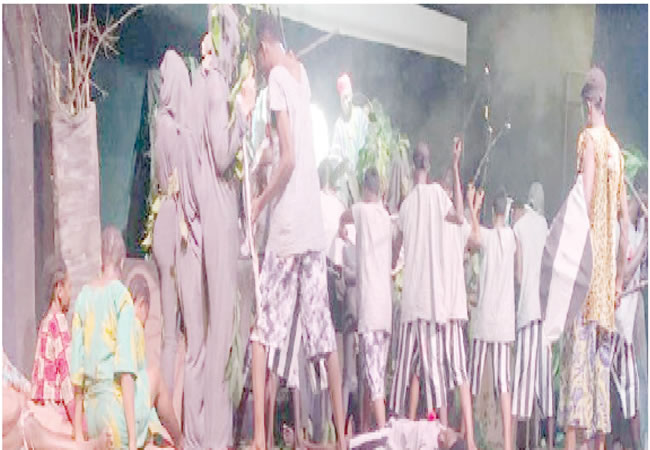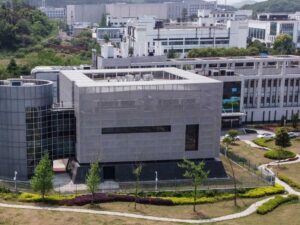
There are many ways the theatre can teach a people about their history and, more importantly, help them envisage their future. Moreover, whether it is in rehashing history or predicting the future, the theatre − first and foremost − is a place of fun and amazement.
English actor and singer, Tim Curry, encapsulated this better when he said, “The way the world is, I think a silly evening in the theatre is a good thing to take our minds off terror.”
Furthermore, a better human angle of the theatre is well captured by the Irish poet and playwright, Oscar Wilde, in his popular quote: “I regard the theatre as the greatest of all art forms, the most immediate way in which a human being can share with another the sense of what it is to be a human being.”
On a cool Wednesday evening, under the blazing colourful lights of the Wole Soyinka Theatre, University of Ibadan, all these fascinating attributes of the theatre were meticulously adopted by some of the students of the Theatre Arts department, on the occasion of the university’s 74th convocation ceremony, to teach and, at the same time, entertain the public on the intricacies, complications, and aftermaths of war on a people and society.
The stage play is entitled ‘The Siege’ written and directed by Oluyinka Smart Babalola, a consulting director and art fellow of the University of Ibadan.
The play is set in the 1800s of Ogbagi-Akoko in Akoko division of the present Ondo State. Ogbagi, even though a small town, had remained unconquered − defending its freedom and independence − by the hordes of invaders that wage wars against it. As time goes on, its powerful lords and warriors become a menace to their immediate neighbours for their high-handedness and oppressive overlordship.
Thus the oppressed neighbouring towns and villages conspire to destroy Ogbagi Kingdom by inviting the notable Eyo warriors from the Bini Empire. It is a brutal war, but Ogbagi prevails to the consternation of the conspirators who double their effort to find a stronger warrior who would vanquish Ogbagi.
General Aje (the Tiger) of Ibadan accepts the contract to annihilate Ogbagi with his large and fearsome army. After many months of fighting, the large Ibadan army, unable to defeat Ogbagi, decides to lay physical and supernatural siege on the town, which lasts for seventeen years.
The only spoil of war for the Ibadan warriors is the terrifying Ogbagi masquerade, Ijalamo, which is taken to Ibadan and renamed, Oloolu. The war eventually ends with the entrapment and death of General Aje and his enemy, and also the death of the oppressor-in-chief, Odu Alashe after wasting many human and material resources on an avoidable war. After the war ends, the land is cleansed of evil.
Even though the war is as a result of bullying, tyranny and imperiousness of their leader, the people of Ogbagi unite to repel a much more powerful armed force.
‘The Siege’ is a slice of forgotten history of war and the survival of a united people. Though set in the 1800s, it is a universal story that resonates with the present state of the world − Russia recently invaded Ukraine and has laid siege to Ukrainian cities and towns, forcibly annexing the sovereign state.
The writer and director of the play succeeded in recreating and reordering historical events as a lesson in the futility of war and its high but avoidable human and material cost.
One of the basic aims the play achieved was the affirmation of one of the quotes of the English playwright and theatre director, Edward Bond, which goes thus: “In the end, I think theatre has only one subject: justice.”
The dramaturgy of the play was as simple as it was complex – weaving simple narratives, gesticulations and dialogues around complex Yoruba history, culture, mythology and deities. The fluid alternating use English and Yoruba in the dialogues, the seamless blend of the drums and the songs, and the ease with which the performers move their bodies to the rhymes of the songs left the audience spell-bounded.
Other features that were easily noticeable were the colourful costumes, the weaponry and the beliefs of the characters that mirrored the era the play was set. It even goes behind that to unravel the socio-cultural and psychological underpinnings of characters that left the spectators in awe under the red, blue, yellow and white lights of the theatre.
The Head of Department of Theatre Arts, Dr Bashiru Lasisi, while commenting on the play, noted that this year’s convocation play marked the first anniversary of the vice chancellor’s administration.
Lasisi stated that the play was carefully selected because of its aesthetic potential and the topicality of the issues it addressed. He added that it is a historical play that echoes the present reality of the world where power struggle, dominance, and self-preservation remained the keywords that underline various socio-economic and political struggles that pervade the globe both at the micro and macro levels.
“The existential threat that the mighty pose to the weak and the vulnerable has, in many instances, galvanised the oppressed to rise like the possessed and shock the center-stage players with unparalleled zeal and tact,” he said. “This is an evening of laughter and sorrow, where courage overtakes fear and the hunter becomes the hunted.”
The head of department thanked the entire production cast and crew for their dedication and high sense of commitment, as they worked round the clock to ensure the safe delivery of the play.
The vice chancellor of the university, Professor Kayode Adebowale, while thanking the Theatre Arts department for putting up the show, stated that it was a rare privilege for them to be in the theatre to witness the play.
The vice chancellor said he was impressed by the talent and creativity the students displayed on stage, and promised to give some prizes to the best three performers of the play.
With the vice chancellor were the visitor of the university, represented by the Executive Secretary of the National Universities Commission, Professor Abubakar Adamu Rasheed; chair of the university’s Governing Council; the registrar of JAMB, Professor Ishaq Olarewaju Oloyede; the Deputy Vice Chancellor Academics of the university; the provost of the Postgraduate College of the university.
Other prominent personalities in the audience were Professor Femi Osifsan, Professor Sogolo, and members of staff of the department and of the university.
The chairman of the university’s Ceremonial Committee, Professor Omolola Atalabi, while giving the vote of thanks, appreciated the vice chancellor for supporting the play. He also appreciated the staff and students of the Theatre Arts department for the stellar performance of the play.
She said that the play was one of the university’s convocation ritual and also a way of showcasing the university’s talents to the world. She added that it was also a way of making the convocation guests to relax and enjoy themselves in the beauty of arts.
“I have been the chairman of the Ceremonial Committee for many years,” she confessed, “but I cannot remember the last time we heard this kind of crop of university management and prominent persons in the audience.”
At the end of the play, one thing ‘The Siege’ succeeded in doing was to leave the audience in awe of what the arts and the theatre can do to the human spirit.
After watching the play one of the things that comes to mind was the quote of the American actress and acting teacher, Stella Adler, that the theatre was created to tell people the truth about life and the social situation.
And that was exactly what ‘The Siege’ portrayed.








